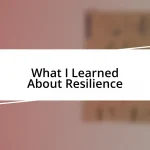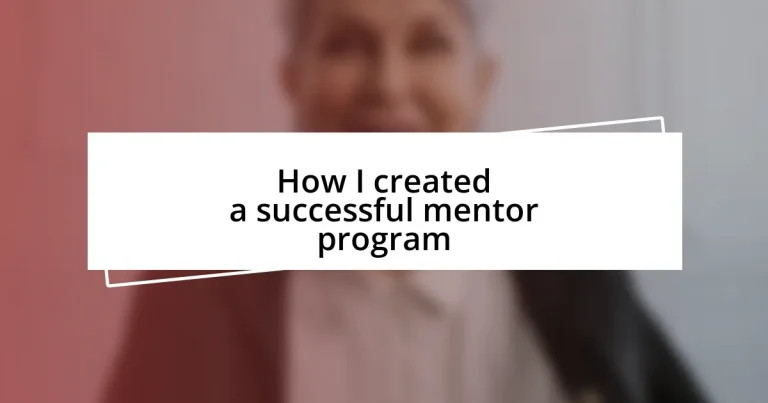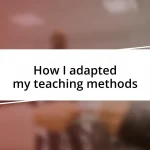Key takeaways:
- Identifying the need for mentorship often stems from recognizing feelings of being lost or unsupported, emphasizing its role in building confidence and resilience.
- Defining clear goals and collaborative objectives enhances commitment and focus within mentorship programs, promoting measurable growth for participants.
- Recruiting passionate mentors with diverse backgrounds and effective communication skills is crucial for enriching mentorship experiences.
- Regular evaluation and feedback mechanisms foster adaptability, ensuring the program continues to meet the evolving needs of participants.
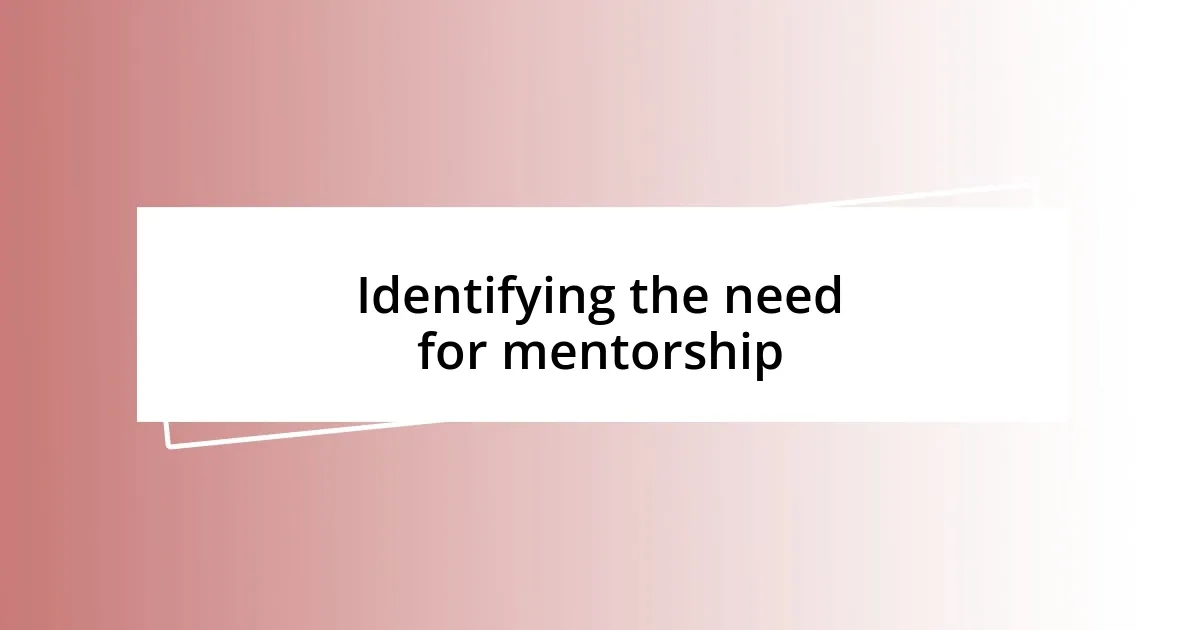
Identifying the need for mentorship
Identifying the need for mentorship often starts with a simple reflection: Are people feeling lost or unsupported in their personal or professional journeys? I remember when I was early in my career; I often questioned my choices and lacked guidance. It was during those uncertain moments that I began to realize just how crucial mentorship could be.
As I observed colleagues struggling with similar challenges, I couldn’t help but feel a sense of empathy. Many were eager to learn but were navigating without a map. Have you ever found yourself in a position where advice would have made all the difference? Recognizing that gap was key. It made me realize that mentorship isn’t just about sharing knowledge; it’s about building confidence and fostering resilience in others.
Furthermore, I discovered that the need for mentorship is often hidden beneath surface-level issues. People may not vocalize their struggles, but you can sense their hesitation or anxiety during conversations. I once mentored someone who seemed outwardly successful but was inwardly battling self-doubt. This experience taught me to seek out those unspoken needs; sometimes, the best mentorship begins with a simple, genuine conversation.
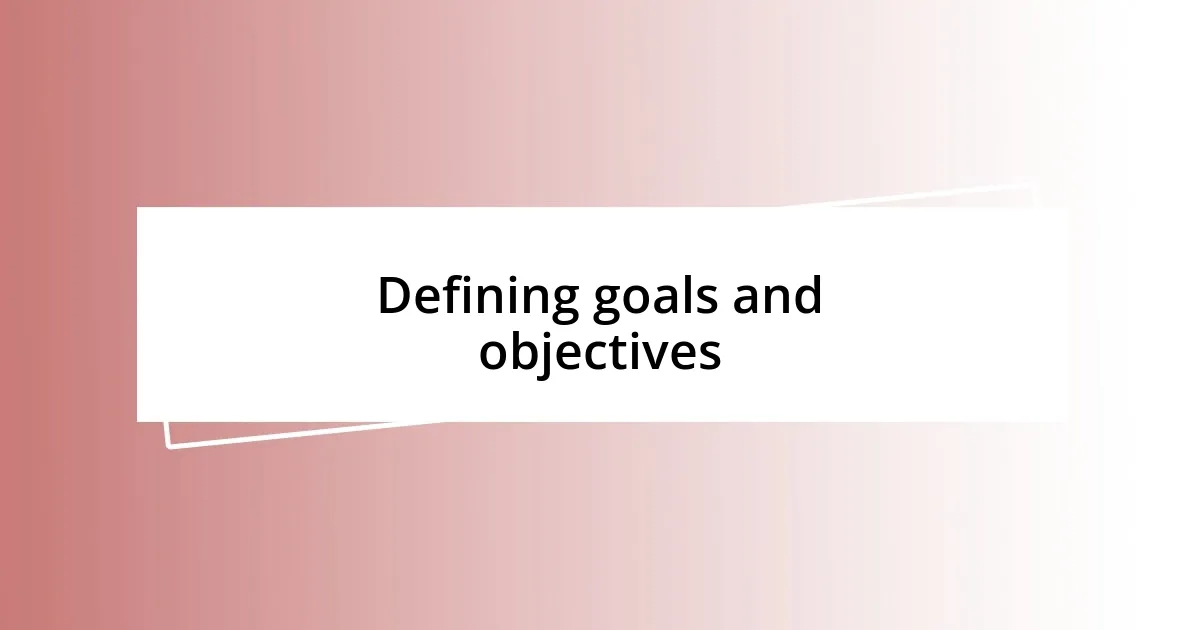
Defining goals and objectives
Defining clear goals and objectives for a mentor program is essential to its success. From my experience, setting specific, measurable goals helps everyone involved understand the direction of the program. For instance, when I initiated my first mentor program, my main objective was to enhance communication skills among participants. The clarity in that goal allowed us to tailor our activities effectively, and I could see growth in the mentees’ confidence during our sessions.
Additionally, it’s important to consider both short-term and long-term objectives. I remember working towards a long-term goal of fostering leadership skills in mentees, which required consistent focus over several months. This layered approach ensured that while we aimed for growth over time, we also celebrated smaller achievements along the way. It’s these little wins that boost morale and keep everyone motivated.
Finally, engaging stakeholders in setting these goals can lead to greater commitment. I recall a brainstorming session where all participants shared their expectations. The diverse perspectives not only refined our objectives but also created a sense of ownership among everyone involved. This collaborative effort lays a strong foundation for a mentor program that resonates with the needs of its participants.
| Goals | Objectives |
|---|---|
| Enhance Communication Skills | Hold monthly workshops focused on active listening and feedback |
| Foster Leadership Skills | Develop a series of exercises designed for team management scenarios |
| Increase Engagement | Conduct regular feedback sessions to adapt the program as needed |
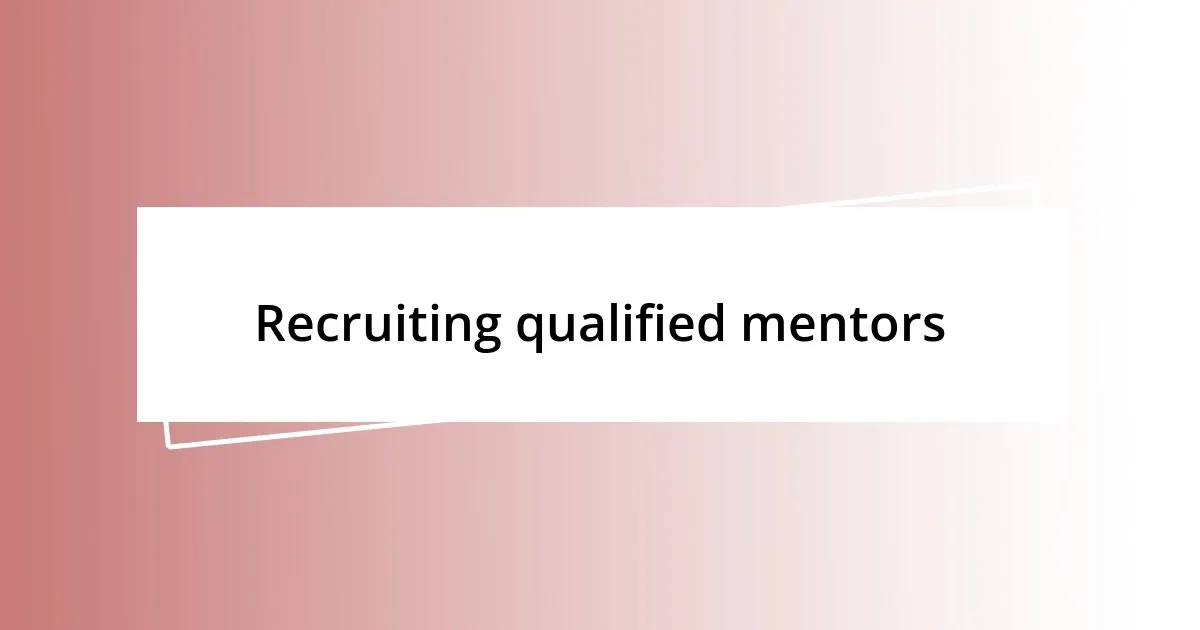
Recruiting qualified mentors
Recruiting qualified mentors is a critical step that shapes the success of a mentorship program. In my own journey, I discovered that the best mentors aren’t just knowledgeable; they are also passionate about sharing their experiences. When I first recruited mentors for my program, I reached out to individuals who had not only excelled in their careers but also demonstrated genuine compassion and openness. I learned that effective mentors possess a willingness to connect, listen, and encourage growth.
To ensure you’re bringing on the right mentors, consider these key factors:
- Expertise: Look for professionals with a solid track record in their field, as their experiences provide valuable insights.
- Communication Skills: Effective mentors should prioritize clear and empathetic communication, ensuring they can relay lessons and feedback constructively.
- Commitment: I’ve found that mentors need to be genuinely invested in others’ growth. This often translates into setting aside time consistently for meetings and discussions.
- Diverse Perspectives: A mix of backgrounds and experiences enhances the richness of your program. My best mentors came from varied paths and brought unique viewpoints that deepened the conversations.
- Adaptability: Talented mentors should be flexible in their approaches, adapting to the needs of their mentees, which was pivotal in my experience.
Each of these elements plays a vital role in attracting mentors who can truly make a difference. I still remember the excitement I felt when I connected with a retired executive who not only had a wealth of knowledge but also deeply cared about nurturing the next generation. That connection not only enriched my program but also instilled a sense of hope and inspiration among the mentees I worked with.
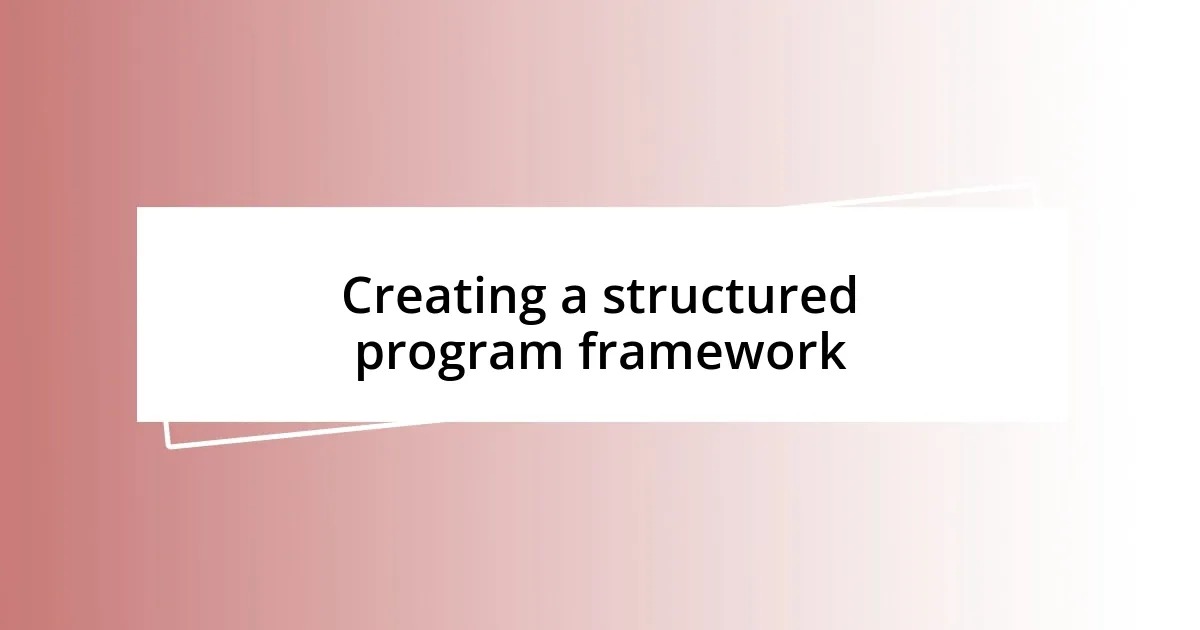
Creating a structured program framework
Creating a structured program framework is akin to laying the foundation of a house. When I set out to design my mentor program, I spent significant time drafting a detailed roadmap that outlined the program’s flow, timelines, and resources required. This helped me visualize every aspect of the program, making it easier to spot potential bottlenecks early on. I often thought about the saying, “Failing to plan is planning to fail.” How true that became as I navigated the complexities of coordinating various activities.
One key element that I emphasized was defining a clear process for matching mentors with mentees. I remember when we successfully paired a shy emerging leader with a confident senior executive. Witnessing their dynamic grow from initial apprehension to a buoyant exchange of ideas was incredibly fulfilling. This kind of structured pairing not only encouraged rapport but also set the stage for meaningful learning experiences. It made me realize that a thoughtful matchmaking process is crucial for fostering the relationships that lie at the heart of mentorship.
Evaluation and feedback mechanisms are also vital components of a structured framework. I made it a point to incorporate regular check-ins where mentors and mentees could share their thoughts. After one session, a mentor expressed their surprise at a mentee’s profound insights on team dynamics. It was these moments of joy and revelation that reinforced the importance of keeping communication channels open. By listening to participants, I could tweak the program continuously, ensuring it remained responsive and relevant. I believe that this adaptability helped create a nurturing environment where everyone felt empowered to thrive.
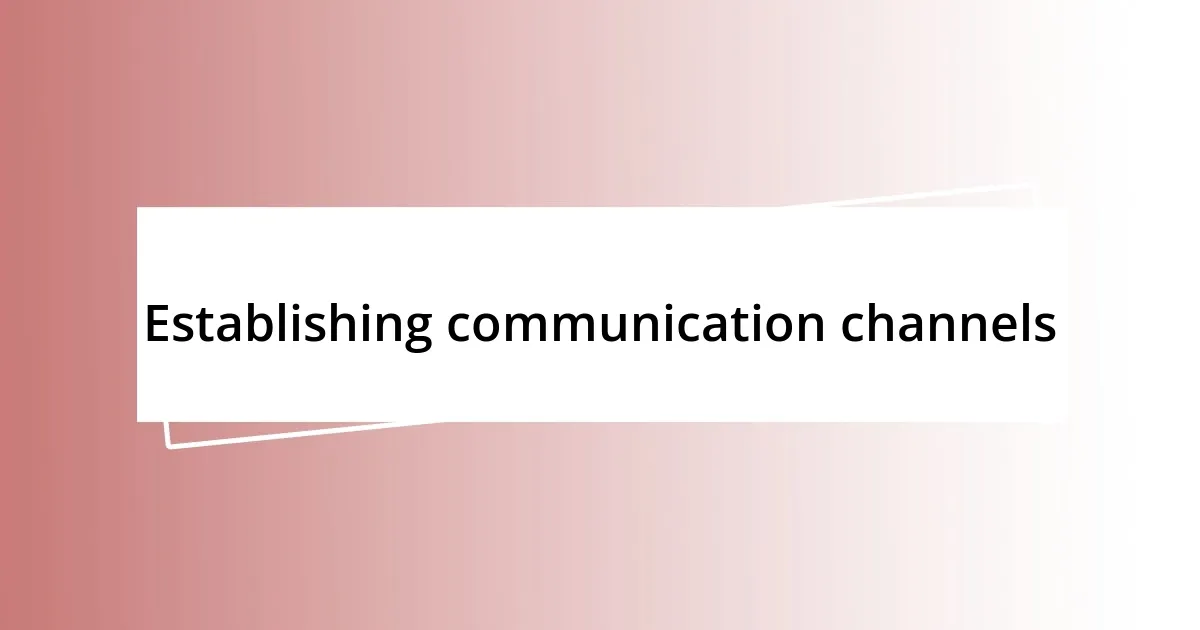
Establishing communication channels
Establishing communication channels within a mentorship program is absolutely vital. From my experience, having an open line of communication ensures that both mentors and mentees feel comfortable sharing ideas, concerns, and progress. I recall setting up a dedicated online platform where both parties could engage in discussions, which proved to be a game-changer. It was exciting to see how a simple chat room fostered an environment where valuable insights flowed freely, making relationships stronger.
In addition to instant communication methods, I discovered that regular, structured meetings played a significant role. I initiated monthly video calls where everyone could share their experiences and successes. I remember one instance where a mentee shared a challenging situation they faced; it turned into a rich discussion with various perspectives coming to light. That moment highlighted just how essential it is to nurture diverse voices and ideas in these channels. Isn’t it fascinating how an open forum can transform individuals into a cohesive learning community?
Lastly, I always encouraged feedback as a core component of our communication channels. After a few months, I created a simple survey to gather thoughts on what was working and what could be improved. The insights I gleaned from these responses were eye-opening. For instance, one mentor suggested we implement a buddy system, pairing mentors to discuss their experiences together. This small change made a huge difference in fostering a sense of camaraderie and support among the mentors, something I hadn’t even anticipated. Have you thought about how feedback could skyrocket your mentorship program’s growth? Trust me, you’ll be pleasantly surprised at the wealth of knowledge your participants might share.
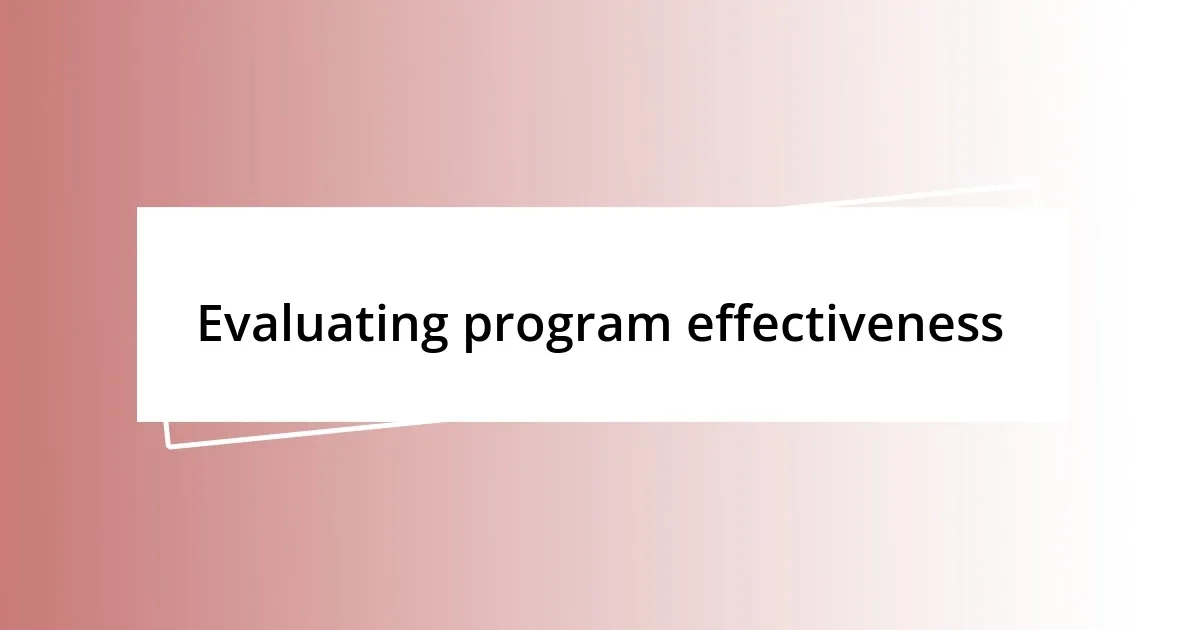
Evaluating program effectiveness
Evaluating the effectiveness of my mentorship program was perhaps one of the most enlightening experiences I had. I initiated this process by developing a series of key performance indicators (KPIs) that included feedback from participants, measurable outcomes, and engagement levels. One particularly striking moment came during a reflective session when a mentee shared how the program had transformed her confidence. Hearing her speak so passionately reinforced my belief that effective evaluation isn’t just about numbers; it’s about the personal stories behind them.
I remember organizing focus groups after the first six months of the program to dive deeper into participant experiences. It was amazing to hear different perspectives, and I was genuinely moved by a senior mentor who emphasized how mentoring helped him rediscover his own motivation. Moments like these highlighted for me the emotional connections that mentorship fosters, making it clear that our program’s effectiveness was rooted in the genuine relationships formed. Are we truly measuring the right outcomes when we focus solely on quantifiable data?
Moreover, I discovered the value of conducting follow-up surveys every quarter. The responses revealed a surprising trend: many participants felt they had grown not only in their professional capabilities but also in personal resilience. This prompted a significant pivot in our approach, steering us toward nurturing both skills and emotional intelligence. Isn’t it fascinating how a simple question about growth can unveil layers of insight? By continuously evaluating and responding to feedback, I was able to create an evolving program that truly reflected the needs of its participants, ensuring its lasting success.
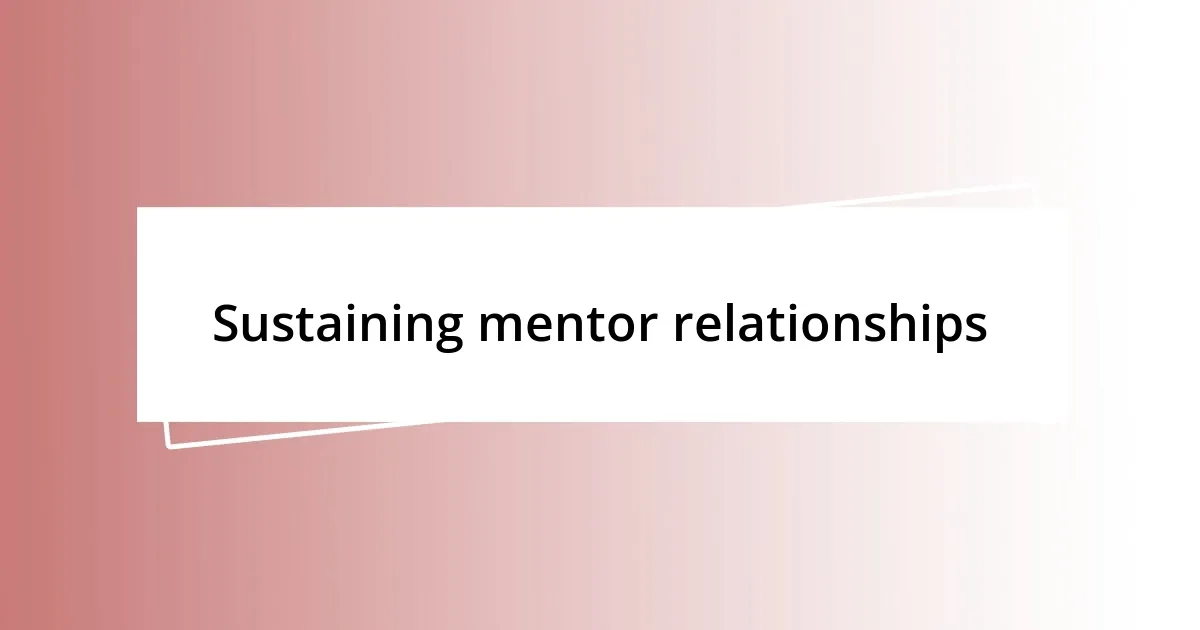
Sustaining mentor relationships
Sustaining mentor relationships requires intentional effort from both mentors and mentees. I find that scheduling regular touchpoints—whether weekly check-ins or monthly coffee chats—helps maintain that connection. One of my mentees once shared that having these set meetings made her feel valued and invested in, which in turn deepened her commitment to the relationship. Isn’t it interesting how consistency can create a sense of security in partnerships?
Building on that, I’ve learned the importance of celebrating milestones together. Recognizing achievements—big or small—can breathe life into the mentorship experience. I recall organizing small “appreciation days” where mentors and mentees would exchange personal notes of gratitude. The first time we did this, a mentor told me how that simple act reignited their enthusiasm for guiding others. Have you ever considered how reinforcing those positive experiences could invigorate your relationships?
Lastly, nurturing authenticity in these connections truly enhances sustainability. I often share my own vulnerabilities or challenges with mentees to create an open space for honest dialogue. By fostering this authentic environment, a mentee once opened up about their fears of failure, which led to a transformative discussion about resilience. It struck me how our own stories, when shared freely, can bridge gaps and create lasting bonds. This authenticity not only solidifies the relationship but also enriches the learning journey. How might your mentorship dynamic shift if you dared to be more open and real with each other?
